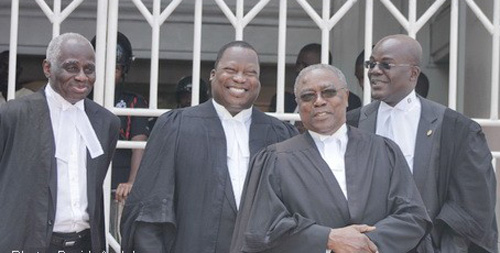Election Petition: Lawyers to give oral addresses on August 7
 Lawyers in the presidential election petition have been granted permission to give oral advocacy for and against the maintenance of Mr John Dramani Mahama as the President of the Republic of Ghana.
Lawyers in the presidential election petition have been granted permission to give oral advocacy for and against the maintenance of Mr John Dramani Mahama as the President of the Republic of Ghana.
They have been allotted 30 minutes each to make their oral addresses on August 7, 2013. Hearing might resume on August 8, 2013 in the event August 7, 2013 turns out to be a public holiday marking the end of the Muslim month of Ramadan.
According to the Supreme Court, the addresses could be by way of clarifications and necessary additions.
The additions could include responses from the parties to each other’s address.
Oral arguments will be made for and against calls for the annulment of votes due to allegations of persons voting without undergoing biometric verification, over-voting, some presiding officers not signing pink sheets (statement of poll and declaration of results form) and some pink sheets having duplicate serial numbers.
By the court’s orders, Messrs Philip Addison, James Quashie-Idun, Tony Lithur and Tsatsu Tsikata, lead counsel for the petitioners, the Electoral Commission (EC), President Mahama and the National Democratic Congress (NDC) respectively, are expected to address the court to justify why the President should be maintained or changed.
The presiding judge of the nine-member panel, Mr Justice William Atuguba, gave the directive after it emerged that all the parties had filed their written addresses as directed by the court.
Other members of the panel are Mr Justice Julius Ansah, Mrs Justice Sophia Adinyira, Ms Justice Rose Constance Owusu, Mr Justice Jones Dotse, Mr Justice Anin Yeboah, Mr Justice Paul Baffoe-Bonnie, Mr Justice N. S. Gbadegbe and Mrs Justice Vida Akoto-Bamfo.
Addresses are usually filed by parties in a legal dispute after evidence has been led. They normally contain analysis or summary of evidence.
The crux of addresses is to enable parties in a case to lead arguments in their bid to convince the court on why their request must be granted. It also allows parties to find faults with each other’s case and submit on them accordingly.
Late NDC allowed to file its address
The petitioners, the President and the EC complied with the court’s July 17, 2013 orders and filed their written addresses on July 30, 2013 but the NDC could not meet the court’s deadline.
Following from that, the party filed its written address at the Supreme Court registry at 9:50 a.m. on Wednesday and subsequently, Mr Tsikata announced at the court’s sitting that his side was seeking leave to file its address.
Counsel explained that he had mechanical challenges in binding the address, which had more than 10 appendices for the court’s convenience.
Mr Tsikata further stated that he underestimated the timing and as a result he could not meet the court’s deadline, but the petitioners and the bench did not take kindly to his explanation.
‘Communist inferior tactics’
Raising an objection to the late filing of the address, Mr Addison reminded the court that court orders were meant to be obeyed.
According to counsel, the proper thing for Mr Tsikata to have done was to formally inform the court that his side was not in the position to file the address at the time directed by the court.
Mr Addison contended that the court’s orders were explicit to the effect that parties were directed to simultaneously file their addresses and indicated that from the look in the eyes of Mr Tsikata, he “spent all night going through our address”.
He said the attitude of Mr Tsikata amounted to “Communist Inferior Tactics,” and added that with the elimination of Communism, he least expected such behaviour from Mr Tsikata.
'I had a very long sleep'
In response, Mr Tsikata told the court that he in fact had a “very long sleep” and added that he had “up till now” not seen a copy of the petitioners’ address.
He also took full responsibility for the late filing of the address and reiterated that the address was ready on Monday, but for the challenges in the binding.
Mr Tsikata did not take kindly to Mr Addison’s insinuation that he had had the opportunity to study the petitioners’ address.
Mr Justice Atuguba, however, directed him to withdraw his comments which the court found offensive, to which Mr Tsikata obliged.
Bench not happy but allows filing of address
Comments from Ms Justice Rose C. Owusu, Mr Justice Atuguba and Mr Justice Jones Dotse clearly indicated that the bench was not amused by Mr Tsikata’s late submission of the address.
In a terse ruling, the court was of the view that much as the delay in meeting its deadline was to inure to the benefit of the bench, the court’s orders must not be taken lightly by parties.
The bench also took note of the gravity and longevity of the case and the fact that the “sins of counsel” should not be visited “on the head of the client”, and accordingly admitted the address.
By Mabel Aku Baneseh
Writer’s email:
